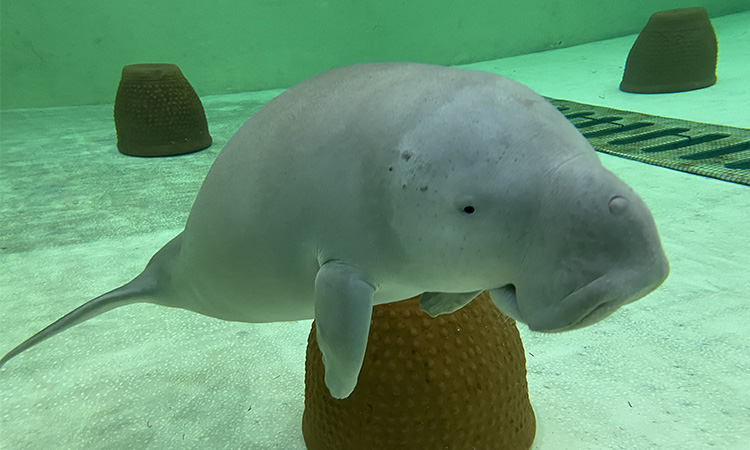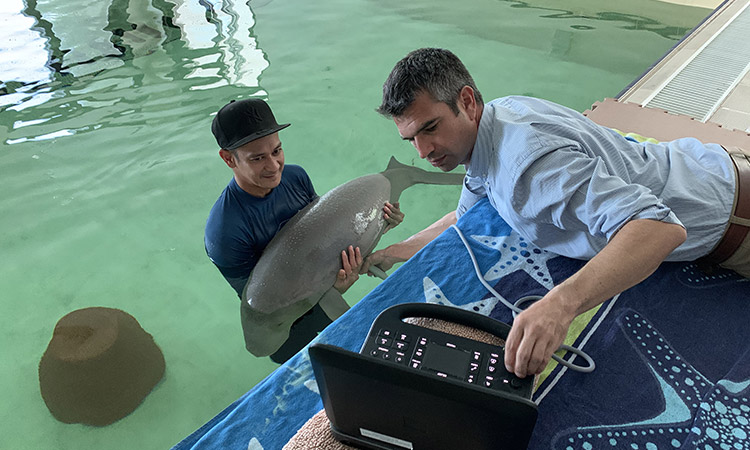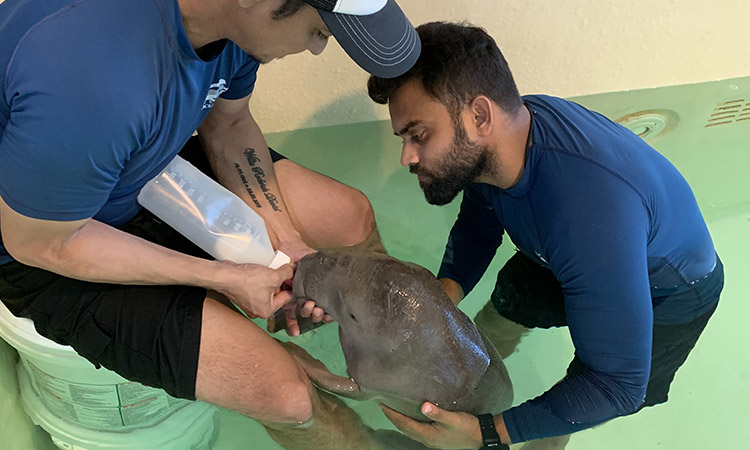[ad_1]

The dugong was named “Malqout” – Arabic for “saved”.
bay today, Journalist
The Environment Agency of Abu Dhabi (EAD) has rescued and rehabilitated a young male dugong calf found abandoned. The dugong was discovered in the Marawa Marine Biosphere Reserve by agency rangers. Alone, without a mother, away from any herd, it was found after a few days of strong winds, which may have been the reason why the dugong was separated from its mother and herd. The dugong has been named “Malqout” – an Arabic word meaning “saved” and “not knowing its owner” – which perfectly expresses the condition of the little animal.
Malqout’s health was assessed by the agency’s specialist marine species team, supported by experts from the Conservation of Migratory Species (CMS) regional office. Due to Malqout’s weight and unstable condition, the agency’s team determined he was dehydrated and malnourished and required specialized veterinary care. It was decided to transfer him to a specialized facility in Abu Dhabi staffed by livestock specialists and qualified veterinarians. Here, the facility coordinates with local zoological experts, Worldwide Zoo Consultants (WZC), to provide veterinary consultation and ongoing specialist livestock care. Due to Malqout’s failing health, experts recommended that he be placed under 24/7 human supervision with appropriate resources capable of providing the highest standard of care.

Malqout’s successful rescue and rehabilitation process is unique and one of the rarest in the world. The agency has successfully cared for Malqout using its extensive experience accumulated over 25 years, including multiple studies and scientific studies on dugong protection and conservation of habitat and marine species, despite dugongs not responding well in captivity. Dugongs are heavily dependent on their mother for the first 18 months of life, but the institution was able to provide the optimal environment for Malqout’s survival.
We provided 24-hour veterinary care for Malqout’s recovery until he was gradually weaned and trained to eat seaweed. To maintain quality of life after the initial period, Malqout needs special care from a qualified veterinarian, including suitable facilities for his growth and protection from changing weather conditions and loud noises. The agency and expert team provided a stimulating environment and the right space in which Malqout could learn natural behavior patterns while ensuring his long-term growth. Specially formulated foods to treat dehydration and malnutrition are provided by an experienced team of veterinarians. Since then, Marcourt has grown from 60 centimeters to nearly two meters long and has received a health certificate.
According to a memorandum of understanding from the Dugong Conservation and Management Secretariat and previous attempts around the world, no dugong has been successfully released into the natural environment to date. Knowing that Malqout lacked the natural survival instincts acquired early in the dugong’s life — and to mitigate any other risks — the agency decided not to release him. Being young and raised in a controlled environment, he has not yet developed normal immunity and has adapted to receive professional human care, which hampers his ability to interact with other species and hide from predators.
Since his recovery, the best option for Malqout has been to continue his life under continuous human supervision, and his survival story is a testament to the quality of care Abu Dhabi provides. The agency and its partners are well prepared to care for Malqout, and a team of veterinarians and dugong specialists will be able to monitor his condition regularly.

Dr Shaikha Salem Al Dhaheri, EAD Secretary General, said: “Malqout’s story is one we want to share with the world as it is a unique and rare occasion as dugongs are fragile animals, dependent on their mother for their first two years life. This brings us to the mission ahead, Malqout needs 24/7 monitoring and feeding to ensure his survival. During his recovery, Malqout has grown profoundly and performed extremely well, his case is how local and international cooperation can help save places around the world The species is a perfect example as our team of specialists at the Abu Dhabi Environment Agency work closely with specialists through the CMS office and dugong MOU, as well as specialist marine veterinarians, to ensure we provide the best possible care.”
Rouba Abou-Atieh, Executive Coordinator of the CMS Office in Abu Dhabi, added: “Rescuing and rehabilitating trapped juvenile dugongs is notoriously difficult. Apart from Malqout, there is only one other documented case of successful long-term care rescued a newborn dugong rescued in 1998 and currently resides at the Sydney Aquarium. There has been no record of successful release of captive-bred dugongs into the wild.”
She added: “A recent CMS publication, titled ‘Options for dealing with stranded orphaned dugong calves – recommendations for policymakers and managers’, published in December 2022, sought to shed light on when stranded orphaned dugong Challenging and restrictive options available when a calf is trapped. Discovery. Malqout’s situation is highly unusual as he was fortunate enough to receive advanced veterinary care and marine facilities in the UAE after his rescue in 2019. Nevertheless, due to his Having received the necessary care, he will not be able to return to the wild and will continue to require ongoing human care in a simulated environment for his long-term survival.”
Tommy Wilken, CEO of Worldwide Zoo Consultants, said: “Worldwide Zoo Consultants is proud to have contributed to the successful rescue and rehabilitation of the dugong, later named Malqout. Over the past three and a half years, our dedicated animal care experts and Veterinarians, in collaboration with the Abu Dhabi Environment Agency, have done something very rare, successfully rescuing and rehabilitating a stranded newborn dugong calf. We are very proud of this extraordinary achievement. Many hours of work have gone into this work 24/7 care and we are delighted that he is currently thriving, fully stabilized and well adjusted to life in human care. The lessons Malqout taught us in our rescue and rehabilitation work will certainly be of use to the rest of his species Future relief efforts will be of great benefit.”
There are about 3,000 dugongs in Abu Dhabi territorial waters, mostly near Butina Island, which is part of the Marawa Biosphere Reserve and Yasat Marine Reserve. The agency is responsible for protecting the world’s second largest concentration of dugongs after Australia. Therefore, EAD is doing everything in its power to ensure the protection of dugong populations and reduce mortality and any risks that threaten them, thanks to its professional team, which includes experts and researchers dugongs who are well versed in the habits and behavior of dugongs.
[ad_2]
Source link